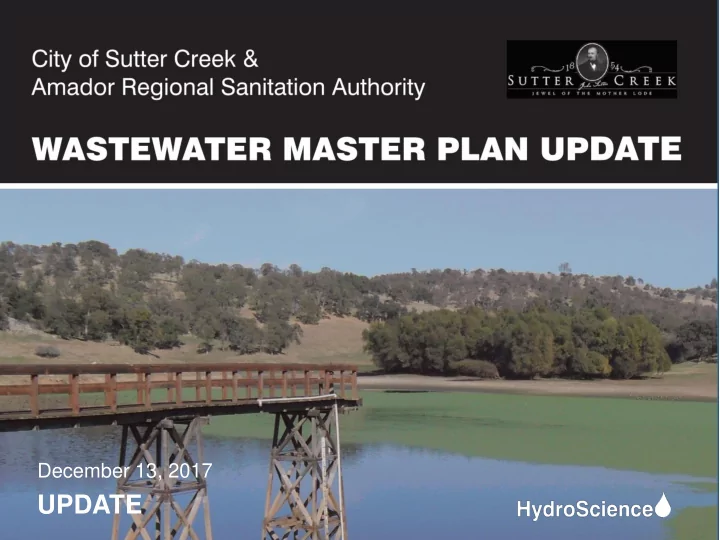

December 13, 2017 UPDATE
Topics 1. Timeline 2. Scope of This Effort 3. Master Plan Findings 4. Next Steps
Timeline
Timeline of the Master Plan and Related Efforts Date Item 7/2008, Dates of prior Wastewater Master Plan (WWMP) and prior updates to the 7/2009, master plan (author: HDR) 2/2010 2011 Ione indicates that it may invoke five-year cancellation clause 11/2011 HydroScience awarded WWMP update contract through competitive process 11/2012 Draft WWMP update submitted 6/2014 Multi-Regional Recycling Feasibility Study with Ione & CDCR initiated 8/2016 Multi-Regional Recycling Feasibility Study with Ione & CDCR completed 4/2017 This WWMP update initiated 7/2017 Ione invokes five-year cancellation clause 12/2017 Draft WWMP update submitted
Scope of This Effort
Scope of This Effort • Update the 2012 WWMP with new information on flows, growth, and water balances and bring in the results of the Multi-Regional Study • Compare Multi- Regional approach to “stand - alone” alternatives (elimination of storage and disposal downstream of Henderson) • Address Henderson Reservoir change – can now repair and keep in service • Compare based on cost and non-cost factors • Provide a recommendation and Capital Improvement Plan (CIP)
Scope Limitations • No updating of TM 3B – changes to surface water discharge requirements not significant to overall picture • Reconsider risks and costs of surface water discharge option • Rely on prior WWTP condition assessment information
Changes During Effort • Ione invoked five-year cancellation clause and indicated no further interest in multi-regional solution • Stand-alone alternatives are now the only feasible alternatives
Master Plan Findings
Report Outline • TM 1: Evaluation of Existing Facilities • TM 2: Flow Projections • TM 3: Initial Evaluation and Screening Options • TM 4: Alternatives Analysis • TM 5: Capital Improvement Plan
Current WWTP Influent Flows
Existing Conditions Water Balance Current
Existing Conditions Water Balance Without Ione Disposal
Other Findings • WWTP needs condition and capacity improvements and/or facility replacements • ARSA pipeline needs condition and capacity improvements • Collection system Infiltration/Inflow (I/I) would be beneficial if cost-effective • Sludge removal in Henderson would restore capacity
Projected Flows • Gold Rush Ranch (GRR) – 18 hole course irrigated with recycled water – 1334 residential units – Develop over 25 years beginning in 2020 (assumption) – Uncertainty surrounding this development going forward or in what form • Modest Population Growth in Service Area
Population Growth
25-Year Flow Projections
Flow Projection Findings • Flows will exceed the current ADWF capacity of the WWTP before 2036 without GRR and 2031 with GRR • PDF will exceed wet weather capacity in 2021 • ARSA flow bottleneck of 2.0 MGD will be exceeded in 2026 • ARSA storage and disposal capacity will be exceeded
Surface Water Discharge Evaluation (TM 3B) • TM 3B prepared in 2012 by RBI, still applies today • Requires nutrient removal, Title 22 filtration, ultraviolet disinfection • Higher O&M cost: Grade III operator, maintenance, energy, reporting, fines potential • Dilution credit and seasonal discharge benefits limited • Eliminates ARSA system and associated costs • Ends reclamation practice unless portion diverted to new recycled water users, difficult to divert from creek later • High cost for permitting+studies, environmental, design • Schedule uncertainty to complete these, urgency to complete given cancellation clause • Final effluent limitations uncertain until studies done • Anti-degradation analysis is required; must evaluate alternatives to surface water discharge
Alternatives Evaluated
Alternatives Evaluated
Alternative 1: ARSA Sprayfields
Alternative 2: Noble Ranch Sprayfields
Alternative 3: Surface Water Discharge
Alternative 4: ARSA Sprayfields and GRR Irrigation
Alternative 5: Surface Water Discharge and GRR Irrigation
Alternatives Analysis
Alternatives Analysis
Evaluation Findings • Alt. 1 is more costly on a present worth basis than Alt 3 • But, spending can be phased further out in time than Alt 3, which must replace entire ARSA system when Ione goes offline (or interim measures taken) • Alt 1 scores better than Alt 3 in non-economic analysis • Alt 1 uses a familiar and accepted disposal strategy and can be adapted to future reuse of effluent • The actual cost and timing of Alt 3 is less certain
Recommended Alternative: Alternative 1: ARSA Sprayfields Potential sprayfield sites shown. Not all will be required. CIP based on single site at similar elevation to Henderson. Lower system not needed if sufficient acreage developed at Henderson
Treatment Upgrades
Capital Improvement Program
Capital Improvement Program
Capital Improvement Program • Henderson sludge removal and initial sprayfields mitigates loss of Ione disposal • Engineering and permitting for Ione Canal begins in first 5 years period, construction in next • WWTP costs potentially could be further spread out
Next Steps
Next Steps • Updated WWTP assessment and preliminary design of upgrades • Ione Canal Reservoir geotechnical study, preliminary design, CEQA, land acquisition • Landowner coordination and agreements, sprayfield development • Phasing refinement and value engineering • Seek low-interest loans and grants
Option: Recycled Water Feasibility Study • Determine if sufficient market exists to sell higher quality recycled water to local users and feasibility/cost of providing it • Utilize flow projections, water balances, tertiary treatment costs, and storage and disposal amounts from WWMP as basis • Develop and evaluate tertiary reuse alternatives • Compare to land disposal alternatives in the WWMP
Option: Recycled Water Feasibility Study • State Water Resources Control Board (SWRCB) Water Recycling Funding Program (WRFP) Grant: up to $75,000 50/50 match • Recycled Water Market Assessment • Legal/Institutional Analysis • Recycled Water Supply Analysis
Input and Direction • Comments and questions on the analysis and recommended alternative • Finalize the WWMP • Interest in recycled water market assessment/study
End of Presentation
Recommend
More recommend